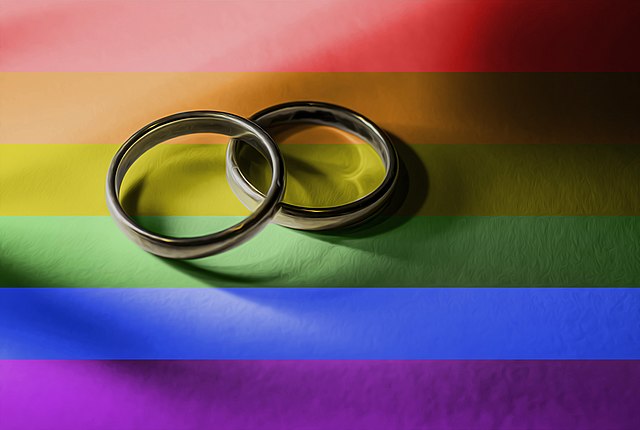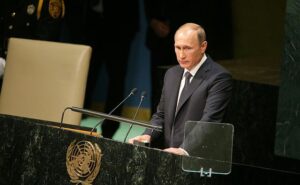Is Marriage Equality the New Geopolitical Litmus Test?
 Let freedom ring by RCB is licensed under CC BY 2.0
Let freedom ring by RCB is licensed under CC BY 2.0
In June 2023, Estonia’s parliament voted 55-34 in favour of legislation which will legalize same-sex marriage when it goes into effect at the beginning of 2024. In doing so, Estonia joins the 34 other nations worldwide that have enshrined marriage equality into law. The case of Estonia, however, represents a distinct victory for supporters of LGBTQ+ rights, as it will become the first post-Soviet nation and the second Eastern-Bloc nation to legalize same-sex marriage after Slovenia. While these countries have historically been hostile towards marriage equality, there has been a shift over the past few years in which these countries have become increasingly intertwined in the European Union’s sphere of influence. Estonia, for example, has seen its internal support for marriage equality increase by nearly 20 percentage points in the past decade. Many countries in the European Union, as well as North America, have gone through similar cultural revolutions and become among the most LGBTQ+-friendly nations. This is likely not a coincidence, as it is evident by looking at the list of 34 nations that protect same-sex marriage that there is a larger correlation present between support of marriage equality and political alignment with the US and its allies. Given this geopolitical context, the question arises: is a country’s choice to legalize same-sex sex marriage a geopolitical signal of alignment with the US and its allies, or is it simply a reflection of a changing culture in that nation?

Looking at the Current List of Countries Protecting Marriage Equality
In studying the list of 34 nations that Estonia will join, which protect their citizens’ right to marriage equality, there seems to be somewhat of a common denominator: geopolitical alignment with the US and its allies. One indicator that helps explain this geopolitical allegiance to the US is the reaction of countries around the world to Russia’s invasion of Ukraine. Of the 34 nations on this list, every single one, with the notable exception of Cuba, voted in the United Nations to condemn Russia following its 2022 invasion of Ukraine. Among these 34 nations, Cuba was also the only one not to vote to remove Russia from the UN Council of Human Rights, although at the time of the vote, Cuba had not yet codified same-sex marriage protections. Only two nations on this list, Brazil and South Africa, abstained. Using support for Russia in its invasion of Ukraine as an indicator of alignment against the US and its allies, it is evident that, with the exception of Cuba and the mild neutrality of Brazil and South Africa, countries which protect marriage equality also seem to support the US geopolitically.
The inverse of this is also true. Of the nations which voted to keep Russia on the UN Human Rights Council, the overwhelming majority also voted against pro-LGBTQ+ initiatives such as the UN LGBTQ+ rights declarations of 2008 and 2011. As an even stronger indicator of pro-Russian alignment, of the five nations which voted against condemning Russia’s invasion of Ukraine, not a single one protects the right to same-sex marriage. This correlation can be understood in the context of a Russian sphere of influence which staunchly opposes LGBTQ+ rights, as Russia has recently doubled down on its stance, expanding its censorship of LGBTQ+ expression in December 2022.
The status of LGBTQ+ rights worldwide, however, does not solely depend on a country’s geopolitical allegiance. An important part of this narrative is the list of countries that are strongly aligned with the US but have yet to legalize same-sex marriage. Among these stand notable US allies such as Israel, Italy, Japan, South Korea and Poland. All of these countries have aligned themselves with the US for decades and continue to stand strongly against Russia’s invasion of Ukraine. In many ways, these nations are among the most pro-American in the world, but they serve as notable foils to the idea of support for marriage equality as a geopolitical litmus test. The case of Cuba serves as an equally notable foil, as it has aligned itself with Russia since the Cold War era in virtually every other way.

The Nuance of LGBTQ+ Rights and Geopolitics
Analyzing the state of marriage equality worldwide and recent UN votes regarding the Russian invasion of Ukraine, it appears that support of marriage equality isn’t a perfect indicator of geopolitical affiliation. Nonetheless, it is a noticeable trend that marriage equality respecting nations tend to fall under the American sphere of influence. With the exception of Cuba, several other examples demonstrate that the decision to legalize same-sex marriage can serve as a symbol of alignment with the US and its allies.
The case of Estonia serves as an important illustration of this concept, as the nation has moved away from its USSR roots in recent years and towards a pro-US geopolitical position, culminating with its legalization of same-sex marriage and cultural alignment against Russia. Even the decision of the Ukrainian government to consider the expansion of rights of same-sex families amid the invasion can be understood as a cultural rejection of old Soviet cultural conservatism and a push towards the American sphere of cultural influence.
Edited by Darius Jamal.
Featured Image: Let freedom ring by RCB is licensed under CC BY 2.0
